One of the main mitzvos of Chanukah is publicizing the great miracle Hashem performed for our forefathers.
But what makes this miracle different from the many other miracles we’ve experienced throughout the generations? Our very existence as Jews is a miracle. The walls of Yericho sank into the ground. The mighty warriors of Sisera’s army fled in all directions when Hashem threw confusion in their ranks. Overnight, the Angel of Death killed every man in Sancheriv’s army. None of these miracles, however, are commemorated today.
‘);
_avp.push({ tagid: article_top_ad_tagid, alias: ‘/’, type: ‘banner’, zid: ThisAdID, pid: 16, onscroll: 0 });
The Talmud (Megillah 14a) states that more than 1.2 million prophets existed in Jewish history, but the prophecies of only 48 of them are recorded in Tanach. Why? Because only their prophecies contained messages that were pertinent to all future generations. In a similar vein, our yamim tovim were established on the basis of the relevance of their message for all time.
The miracle of Chanukah is remembered because its message is eternal. The Jews had lived under the oppressive reign of the Greeks for 180 years. Matisyahu, advanced in age, rose up with a very small group of men to fight against the well-trained and well-organized Greek army. Rationally, the Chashmona’im didn’t have a chance. They were badly outnumbered. Elifornus had 120,000 soldiers and 22,000 archers while Guskalgas was accompanied by 80,000 soldiers. Matisyahu, however, persevered maintaining that he must do whatever was possible and the rest was in the hands of Hashem.
The Chashmona’im exhibited the same attitude when they found just one small flask of pure oil in the Holy Temple. It was only supposed to burn for one day, and producing more oil took eight days, so they could have easily abandoned the idea of lighting it until seven days had passed. But they were unwavering in their commitment, and Hashem helped them. Chanukah reminds us of this inspiring devotion every year, and that’s why it was established as a yom tov for all generations.
The Medrash Rabbah says that when Moshe saw the wondrous vision of a burning thorn bush that wasn’t consumed while tending to the flocks of Yisro, he took five steps to more closely observe the sight (the Medrash Tanchuma says he took three steps and Reish Lakish says he merely turned his head). In response, Hashem said, “Since you troubled yourself to see this, I will reveal Myself to you.” Hashem proceeded to call to him from amid the burning bush. The Medrash says that if Moshe had not made an effort to inspect the bush, he would have lost everything.
A person must give serious consideration to what he can lose if he doesn’t make even the slightest effort to accomplish a task. The Zohar tells us that Bisya, the daughter of Pharaoh, has a special chamber in Gan Eden where Moshe Rabbeinu visits her every day to inquire after her wellbeing. Why does she receive such an honor? Because, our sages relate, when she saw Moshe’s bassinet in the river, she stretched out her hand toward it despite the fact that it was well beyond her reach. She made the effort.
Two elderly dayanim once made a pact that whoever departed this world first would return to his friend to reveal what happens in the next world.
One of them was soon niftar and revealed himself to his fellow dayan. He related that he had been brought before the Heavenly Court to be judged. The good angels brought a large pile of his mitzvos and placed it on one side of the scale, and then angels of destruction came with piles of aveiros he had committed and loaded them on the other side of the scale. It looked like the mitzvos would outweigh the aveiros, but then an angel came running in with the aveirah of bribery, and the scale tipped the other way.
The dayan painfully recalled the sin. It had taken place years earlier when he was very poor. The plaintiff was a very wealthy individual and, right before his court appearance, he tucked a large amount of money into the dayan’s pocket. The dayan was overcome by temptation and allowed the matter to pass because he rationalized that he had not “taken” a bribe as the Torah forbids; he had merely not returned a bribe that was given to him.
The judge was sentenced to Gehenom, and the angels of destruction immediately began to lead him there. As the intense heat of Gehenom’s fire assailed him, the judge began to cry and begged for a reconsideration of his sentence. His plea was accepted, and he received a different punishment. He was given a small hammer and told to destroy the huge towers that suddenly appeared before him.
As he looked at the towers, he realized the futility of his assignment. Even if he worked for years, there was no way he would be able to destroy the towers with a small hammer. But he decided to forge ahead, telling himself: In Olam Hazeh I studied Torah and prayed in fulfillment of Hashem’s will. I wish to do His will in this world, too, so if He asks me to destroy these towers, I will try to do it with the tools I have. He went up to the top of one of the towers and began to bang with his hammer. As soon as he did so, the towers magically disappeared. Two good angels then instantly appeared and escorted him to Gan Eden.
We often go through life thinking we don’t have the wherewithal, or the proper tools, to overcome the challenges the yetzer hara throws our way. All we see in front of us are tall towers. The truth is, though, that if we strengthen our emunah in Hashem, the towers will turn out to be mere apparitions, even if it seems like we don’t have the right tools. Bitachon can nullify all physical powers in the world and elevate an individual to a supernatural state.
‘);
_avp.push({ tagid: article_top_ad_tagid, alias: ‘/’, type: ‘banner’, zid: ThisAdID, pid: 16, onscroll: 10 });




